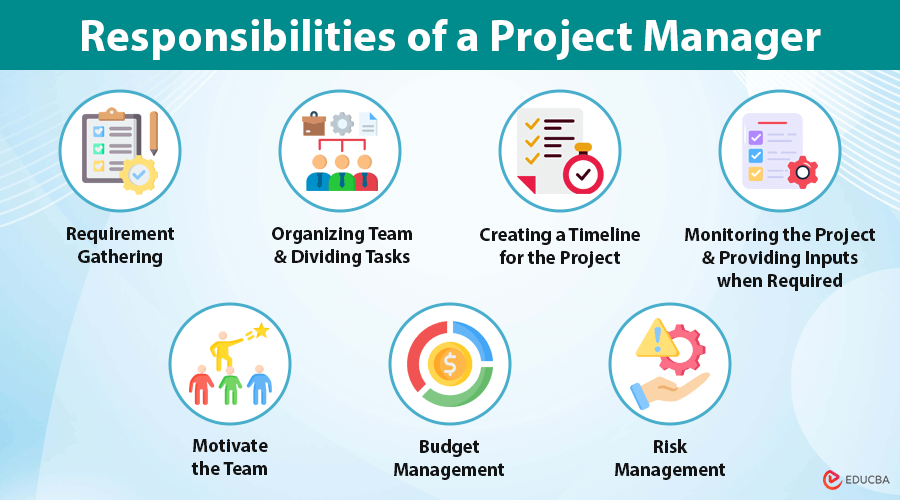
Overviews for Project Manager?
Before we start discussing the role of a project manager, let us first understand who is a project manager and why is a project manager required in any project. Projects are basically tasks assigned to a team to be completed on time. This is where the role of a project manager comes, to make sure that the team assigned to work on the project fully understands the expectations from the project and appropriately delivers what is required out of it on time.
The project manager acts as an interface between the client and the project team so as to provide both parties with what they are expecting from the project. Hence, the communication between the client and the project resources takes place through the project manager. The project manager leads the whole team to ensure that the goals are achieved and delivered to the client within the specified deadlines without any errors. He/ She acts as an anchor and is required to spearhead the project to success, as the fate of the whole project is dependent on them.
Responsibilities of a Project Manager
A project manager’s responsibilities include overseeing the whole project management life cycle from the start to the end of the project, which involves:
1. Requirement Gathering
The project manager needs to make sure that the requirements of the project are correctly gathered from the source/ client, as this is the first and main step of any project. If the requirements are correctly known, only then can the project manager select resources to work on the project according to its need.
2. Organizing Team and Dividing Tasks
After gathering the information on the project and understanding what needs to be done, the project manager must organize the whole team and divide the tasks between them according to their skills and requirement so that they can help in achieving the goal of the project with their full potential. Here, the project manager’s organizational skills are tested, as any fault in rightly organizing the team would lead to failure of the project.
3. Creating a Timeline for the Project
The most important thing to keep in mind for a project manager is to create a timeline for the project and adhere to it. It is very important for the whole team to know what tasks are expected to be completed from their end and at what time. Hence, according to the timeline of the project, the team members would keep the right pace in finishing their tasks and ensure that everything is delivered on time.
4. Monitoring the Project and Providing Inputs when Required
The project manager should keep track of the project at each step and make sure that the assigned tasks are being delivered as expected. Also, he/ she should make sure to communicate with all the team members to track their progress individually and likewise provide input to better their performances if required.
5. Motivate the Team
Setting up the team, assigning tasks, and creating a deadline is not the only thing that needs to be done; a good project manager should make sure to acknowledge the hard work of all the members of the team and accordingly provide rewards and compensation to keep them motivated. Not all the members are equally driven to achieve the goal; hence it is necessary to communicate with them individually to understand what they require to accomplish their tasks and help them with that so they can align their own growth with the project’s growth and put their best efforts.
6. Budget Management
A budget of a project is usually fixed right at the start of the project with the project manager. What a project manager should ensure then is that the budget is enough to get the project done and there are no budget issues introduced in the middle of the project as it progresses, because it will become difficult to solve these issues then and the project would run a risk of costing more than it is bringing in. So, the budget, once decided for the project, should also be known to the team members as it will help them have an idea as to how much work hours they have to put in to successfully complete the task knowing the hours budget.
7. Risk Management
This is a very important skill for the project manager, one in which he should be adept. A project manager should be competent enough to identify the risks the project might potentially run into and be prepared with alternatives to tackle them. They should be ready with ways to handle unexpected scenarios taking into consideration that the project will be still delivered on time without bearing a lot of expenses on other solutions.
Conclusion
In conclusion, all we can say is that the role of the project manager is of prime importance as it decides how the project will be driven. Their responsibilities may change depending upon the type of project they will be handling, but some of the key responsibilities as mentioned above are the ones which they should follow invariably and to their best. Also, the project’s success is dependent on both the team members and the project manager as well, and hence it requires their combined effort in the right direction to achieve the goal of the project. How well the project manager manages, the team will show how efficient it is in accomplishing its task.
It is important for both the team members and the project manager to acknowledge that their compensation depends on the outcome of the project and hence align their efforts in the same line to achieve positive outcomes and results.
Recommended Articles
This has been a guide to the Role of a Project Manager. Here we discussed the basic concepts and 7 crucial responsibilities of the Project Manager with a detailed explanation. You can also go through our other suggested articles to learn more –

